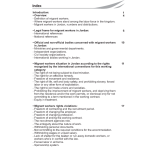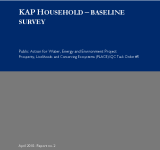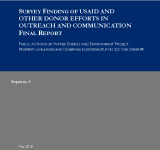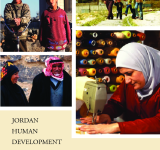changing
The report is based on the KAP household baseline survey;; which measures the current awareness of methods of water and energy conservations to determine how the Jordanians currently dispose of their household waste and how serious they believe the threat of global warming to be in Jordan. The household baseline survey on the use of water;; energy;; and the management of solid household waste has been designed based on the Knowledge;; Attitude and Practice (KAP) model;; and it aims to serve as a prelude to education and changing public behavior in the water and energy sectors in Jordan;; and to supply specific initiatives in the environment;; in particular in regard to the management of solid household waste. The research is based on a qualitative research;; a questionnaire and semi-structured interviews. The report concludes with the main findings that the most trusted sources of information on water conservation were the Ministry of Water and Irrigation;; and the Jordan Water Company. The survey finds that the respondents believe that the water shortage can be overcome with the water authorities' leadership including their engagement in grand projects.
The report is based on the outreach and communication survey of USAID and other donors' efforts. It is part of the Public Action Project;; which supports USAID's technical and policy investments in the Jordanian water and energy sectors and specific initiatives in the environment. The survey was designed to report on past;; current and planned donor efforts in relation to water;; energy and solid waste management – with the main focus on water sector. It is intended to help the PAP team to design communication strategies and specific behavior change campaigns by building on lessons learned from outreach efforts. The report is based on the survey consisting of 39 open-ended interviews with donor officials and managers of donor-funded projects;; and it includes analysis and recommendations on coordination with current and planned donor projects. The report recommends improvement in coordination through development of national communication strategies;; assistance in water and energy sectors to establish trust and credibility with their customers;; reduction and streamlining of programs targeting schoolchildren;; and setting up of priority areas for change through technical assessment in water and energy.
This report consists of eight chapters and aims to summarise the key concepts of human development. It introduces the Human Development Index;; provides an overview of Jordan's human development achievements;; examines the regional vulnerability context that has constrained Jordan's options in its pursuit of social and economic development;; provides a platform for the poor to express their views and perceptions in relation to their poverty status;; reviews the policies;; institutions and processes that affect the poor;; examines the government's attempts to stimulate entrepreneurialism;; promotes the application of a rights-based approach;; in which all citizen are equally empowered and have the capacity and the appropriate enabling environment that allows them to claim their entitlements according to law. Finally;; the study examines the various reform initiatives in progress and assesses the extent to which Jordan is committed to the process.



